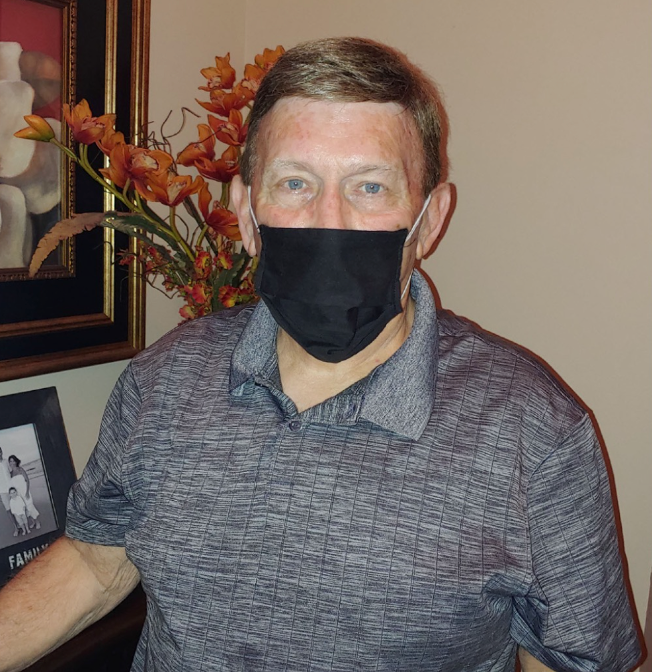Share this article
When COVID-19 swept into North Carolina last March, hospitals across the state had to quickly innovate. The challenge? Ensuring every patient got the care they needed, while also keeping patients, families and healthcare workers safe.
One transformative solution was to care for patients not just outside of the hospital, but right in their homes. Charlotte-based Atrium Health launched a program, now called Atrium Health Hospital at Home (AH-HaH) to give people with mild COVID-19 symptoms the option to be cared for in their own homes through a “virtual hospital.”
Why seek care in a “virtual hospital”?
“It is critical we find innovative ways to free up beds at our hospitals for the sickest patients.”
Shifting care to people’s homes not only kept them safe and comfortable, but also freed up hospital space and staff for critically ill coronavirus patients.
“During these unprecedented times, it is critical we find innovative ways to free up beds at our hospitals for the sickest patients due to the coronavirus,” says Scott Rissmiller, MD, EVP, and chief physician executive at Atrium Health. The AH-HaH program also slows the spread of the virus in the community by helping people stay home until they’re past infection. Mostly, the option to be cared for at home enables patients to stay safely with their families during treatment and recovery.
How the home-hospital works
“We can spot any trends or worsening symptoms and intervene early, before it becomes an emergency.”
Coronavirus patients can be “admitted” to the AH-HaH in one of two “units.” Patients who aren’t as sick are cared for through the virtual observation unit. They are monitored remotely using digital tools that track their blood pressure, oxygen levels, and temperature, and nurses check in each day.
Sicker patients can still be treated at home and are admitted to the “virtual acute care unit.” Their vital signs are monitored from specialized hospital beds delivered to their homes. Physicians conduct virtual rounds, meaning they are regularly visited virtually by a doctor, and nurses check in on them twice a day. Patients can interact with care teams around the clock if they need to. “Through 24-hour monitoring, we can spot any trends or worsening symptoms and intervene early, before it becomes an emergency,” says Rissmiller.
Community paramedics—already trained to deliver care in the home as well as emergency transport—conduct in-person visits, managing blood work, oxygen support, or IV medications, all in the patient’s home.
Patients attest to the comforts of home
“The whole COVID-19 team and Atrium Health Hospital at Home were God-sent.”
71-year-old Zeb Starnes discovered how real a threat COVID-19 is, after attending an indoor funeral of a friend. “I really wasn’t taking precautions like I should have been,” he says, looking back on his decision to attend the service without a mask. He and about 20 other attendees came down with COVID-19 soon after. “At that point I was very nervous and scared,” he says.

Doctors determined that Starnes could be cared for by the AH-HaH team. “This group was absolutely amazing,” he says. “For 14 days, we were visited by a paramedic and had a virtual doctor’s visit.” He is grateful to have been able to heal at home, while still accessing quality care. “The whole COVID-19 team and Atrium Health Hospital at Home were God-sent,” he says.
Keeping vulnerable cancer patients safe
“We were worried for our patients.”
When coronavirus cases surged over the winter, cancer doctors and nurses re-evaluated how they could safely care for their cancer patients. Data showed that these patients were at especially high risk of complications, says Brittany Ragon, MD, who specializes in hematology at Atrium Health’s Levine Cancer Institute. “They had a higher chance of contracting COVID and a higher likelihood of dying from it. We were worried for our patients and needed a way to mitigate some of those risks for them.”
The AH-HaH program was the answer. A Levine Cancer Institute team offered at-home care to cancer patients with COVID-19. Lung cancer patient Fidel Goodnight received care through AH-HaH when he discovered he was COVID-19 positive. He was grateful to have a nurse navigator check on him each day. “It was reassuring,” he says. “I did exactly what they said – stayed home, bundled up, didn’t expose anyone.”
Goodnight shared that he feels fortunate to have had a mild case of the virus but that COVID-19 can be unpredictable. He says that the daily check-ins at home from Levine Cancer Institute, where he already knew so many members of the care team, “absolutely made a difference.”
Beyond the pandemic
Now, the AH-HaH team has cared for thousands of patients and is sharing the important insights they’ve learned about treating patients at home with doctors and other healthcare providers across North Carolina and the country through a paper published in the Annals of Internal Medicine.
Ultimately, the innovative program kept patients safe and comfortable while they healed from COVID-19, and the strategies for treating patients at home can be used to keep communities safe in future crises.